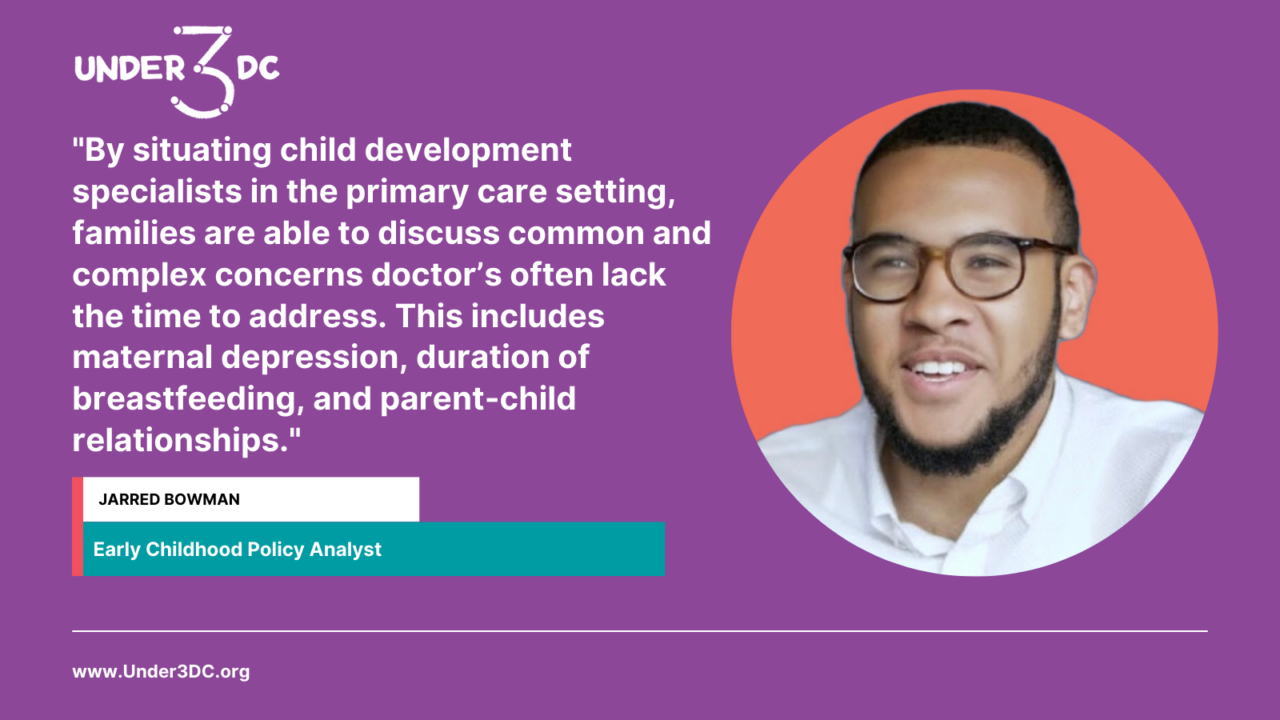Testimony of Jarred Bowman, Early Childhood Policy Analyst
Introduction
Good morning, Councilmember Gray and members of the Committee on Health. Thank you for the opportunity to address the Council as it conducts this budget oversight hearing for the Department of Health (DC Health). My name is Jarred Bowman, I am a 5th generation Ward 4 resident, and I serve as the Early Childhood Policy Analyst with DC Action and the Under 3 DC Coalition. DC Action uses research, data, and a racial equity lens to break down barriers that stand in the way of all kids reaching their full potential. Our collaborative advocacy initiatives bring the power of young people and all residents to raise their voices to create change.
I would like to focus my testimony today on the importance of increasing access to child development specialists in pediatric primary care settings for thousands of young children in the District through the Department of Health’s (DC Health) HealthySteps program. We are grateful for the Council’s continued commitment to the health and wellness of families in DC and for the ongoing support for the important mission of HealthySteps. Increasing public investments in the District’s HealthySteps program by at least $300,000 (recurring) in the FY 2023 budget will fund an additional HealthySteps site and further the Birth-to-Three for All DC expansion of the family health support program, effectively deepening our investments in communities where we know enhanced pediatric primary care services are needed the most.
HealthySteps Is A Vital Public Resource for Families with Infants and Toddlers
The Healthy Steps program is a family health program focused on supporting children and families during and in between visits to the pediatrician’s office. A national evidenced-based model, the DC Healthy Steps program utilizes a continuum of services ranging from universal health screenings for all families to more intensive services provided to families most at risk of health outcomes that could be life threatening. By situating child development specialists in the primary care setting, families are able to discuss common and complex concerns doctor’s often lack the time to address. This includes maternal depression, duration of breastfeeding, and parent-child relationships. Studies show that children who receive social-emotional screenings in the first three years are more likely to have access to long-term psychological support within their medical home that can effectively meet their individual needs. Furthermore, research shows that early prevention and detection of adverse childhood experiences can reduce the likelihood of risk behavior(s later in life. HealthySteps is the kind of preventative people-centered support service that DC’s young children and families need to thrive.
The Healthy Steps program under the Birth to Three expansion is currently operating in three pediatric primary care offices in the District, including Children’s National Hospital at Anacostia, and Unity Health Care off of Minnesota Avenue and Benning Road in Southeast, DC. Based on information from DC Health, we anticipate two new sites will become available in Wards 7 and 8 this fiscal year. In FY21, DC Pritzker Children Initiative (DC PCI) collected data from both Children’s National HealthySteps sites and one Unity HealthySteps site. Together, these three sites served 1,192 children, compared to 415 children served by these three sites in FY20. This represents a 287% increase in children served between FY21 and FY22. More broadly, data from national evaluations of HealthySteps has shown decreased utilization of the emergency room, reduced usage of harsh parenting practices, and increased receipt of well-child visits and vaccinations for children participating in the program. Additionally, some states show an annual return on investment to Medicaid of over 80%.
We are pleased with the tremendous work DC Health has been doing to increase access to these critical services east of the river and we hope to continue to see investments there in FY23 and beyond. Due to systemic racism and structural disinvestment, the most recent data show that over 40% of Black children under 5 in Wards 7 and 8 live in poverty. In Ward 5, 22% of Latinx children under 5 live in poverty; that is almost twice the DC average. With an estimated 10,000 children under age 5 living in poverty we know that many more families in the District stand to benefit from HealthySteps — this is why we strongly support the continued expansion of the program in communities of need. In order to do this, we ask the Council to increase the Healthy Steps program budget by $300K in FY23 so that more children and families will gain access to essential child development services that are embedded in their pediatric wellness visits. These funds will allow the Department of Heath to expand these vital services to one additional site in Ward 5, 7, or 8 in the District.
The Mayor’s Budget Fails to Invest in Programs like HealthySteps that Strengthens Communities
Unfortunately, there are no new investments for HealthySteps in the Mayor’s fiscal year 2023 Health and Human Services budget. For Ward 5, this means that 4,000 infants and toddlers will either have to continue traveling to other communities to access the HealthySteps program, or will have no access to the program whatsoever. This is a policy choice that creates barriers for families with young children to access important family health services in their own community, and threatens to deepen existing inequities in Black and brown infant and maternal health outcomes.
As the Mayor’s budget fails to enhance important programs for families with young children, it also proposes a $30M increase to the Metropolitan Police Department’s budget in FY23. This represents another policy choice that prioritizes funding for carceral responses to inequality, rather than increasing funding to programs like HealthySteps that address family needs early on and respond to the underlying conditions that are oftentimes connected to the life-threatening circumstances that disproportionately affect poor Black and brown families in DC. As the movement lawyer Derecka Purnell writes in her book Becoming Abolitionists, “economic deprivation and neighborhood segregation do not happen by accident and poverty does not grow from the ground.” Right now the Mayor’s FY23 budget concentrates investments in mechanisms that enforce criminalization and punishment far beyond what she invests towards resources like HealthySteps that actually help families thrive. Ultimately, we believe this minimizes the number of people who get to have a fair shot in DC. We call on the Council to use the District’s revenue to invest in evidence-based prevention strategies so infants and toddlers can grow up in a society that is ready to support and empower them — not police them.
Conclusion
Since the pandemic, HealthySteps has adapted considerably to meet the needs of children and families in DC, and we are pleased with DC Health’s ability to continue to expand access to this important program in communities historically deprived of these supports. We are grateful to the HealthySteps team and their leadership of this program, and look forward to continuing to work together to promote well-rounded family health supports in the District.


